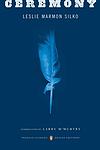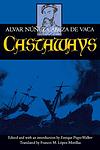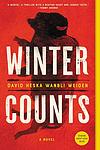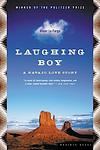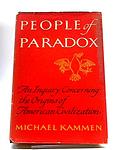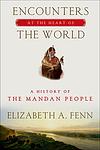The Greatest "Native American" Books of All Time
Click to learn how this list is calculated.
This list represents a comprehensive and trusted collection of the greatest books. Developed through a specialized algorithm, it brings together 300 'best of' book lists to form a definitive guide to the world's most acclaimed books. For those interested in how these books are chosen, additional details can be found on the rankings page.
Genres
Countries
Date Range
Reading Statistics
Click the button below to see how many of these books you've read!
Download
If you're interested in downloading this list as a CSV file for use in a spreadsheet application, you can easily do so by clicking the button below. Please note that to ensure a manageable file size and faster download, the CSV will include details for only the first 500 books.
Download-
26. The Almanac of the Dead by Leslie Marmon Silko
"The Almanac of the Dead" is a complex narrative that explores the histories and struggles of indigenous peoples in the Americas, particularly in the Southwestern United States and Central America. The story is centered around a 500-year-old manuscript known as "the almanac," which prophesizes a massive, revolutionary upheaval led by the indigenous people against the oppressive forces of capitalism and colonialism. The novel delves into themes of resistance, survival, and the power of storytelling, weaving together a multitude of interconnected narratives and characters.
-
27. Collapse by Jared Diamond
"Collapse" is an exploration of why certain societies throughout history have thrived while others have deteriorated and collapsed. The book delves into environmental problems, climate change, rapid population growth, and unwise political decisions as factors that contribute to the downfall of a civilization. The author uses examples from history such as the Mayans, the Vikings in Greenland, and modern examples like Rwanda and Haiti, to illustrate his points. It serves as both a historical analysis and a warning for modern societies to learn from the past in order to avoid a similar fate.
-
28. Slavery by Another Name by Douglas A. Blackmon
The book explores the concept of "neoslavery," which entrapped thousands of African Americans in the South in a system of forced labor after the Civil War. This system was perpetuated by local laws, racial prejudice, and economic manipulation, where black men were arrested on false charges, then sold to companies as cheap labor. The book illuminates the forgotten history of this "age of neoslavery" that persisted into the 20th century and its profound impact on the racial disparities that exist today.
-
29. Castaways by Alvar Núñez Cabeza de Vaca
"Castaways" is a historical narrative that recounts the experiences of an early Spanish explorer who, along with his crew, shipwrecks off the coast of Florida. Stranded in unknown territory, the survivors must learn to adapt to the harsh environment, interacting with native tribes and navigating through unfamiliar landscapes. The story is a testament to human resilience and the profound impact of cross-cultural encounters during the age of exploration.
-
30. The Wordy Shipmates by Sarah Vowell
"The Wordy Shipmates" is a historical narrative that explores the journey and lives of the Massachusetts Bay Colonists, who left England in the 1630s in pursuit of religious freedom in America. The book delves into the paradoxes of these Puritans, who were both freedom seekers and authoritarians, and their influence on American identity. It also provides a detailed look at their relationships, conflicts, and the hardships they faced, all set against the backdrop of their religious and political beliefs.
-
31. Winter Counts by David Heska Wanbli Weiden
"Winter Counts" is a gripping and thought-provoking novel set on the Rosebud Indian Reservation in South Dakota. The story follows Virgil Wounded Horse, a local enforcer who takes justice into his own hands when the legal system fails his community. When his nephew becomes entangled in the dangerous world of drug trafficking, Virgil embarks on a mission to protect his family and seek retribution. Through its powerful narrative and exploration of Native American culture, the book sheds light on the complexities of modern-day reservation life and the struggle for justice in an unjust world.
-
32. Laughing Boy by Oliver La Farge
"Laughing Boy" is a novel set in the early 20th century that explores the life of a young Navajo man who falls in love with a beautiful, educated woman from his tribe. The narrative delves into their relationship, the clash of traditional and modern cultures, and the struggle for identity amidst societal changes. The story portrays the protagonist's journey towards self-discovery and his struggle to reconcile his love for the woman with his commitment to his tribe's customs and traditions.
-
33. LaRose by Louise Erdrich
In this emotionally charged novel, a man accidentally kills his neighbor's son while hunting and, in an act of ancient tribal tradition, offers his own son, LaRose, as compensation. The narrative explores the complexities of grief, justice, and cultural identity, as both families grapple with the loss of their sons and the impact of this decision. The story is set against the backdrop of the Ojibwe reservation in North Dakota, and the intertwining of the two families leads to unexpected relationships and the healing power of shared sorrow.
-
34. The Problem of Slavery in the Age of Emancipation by David Brion Davis
"The Problem of Slavery in the Age of Emancipation" is a historical work that explores the complexities of slavery and the abolitionist movement during the Age of Emancipation. The book delves into the moral, political, and ideological challenges faced during this time, focusing on the struggles of enslaved Africans and African Americans. It also examines the role of colonization and the struggle to redefine "black" and "white" identities in the aftermath of slavery. The author uses a comparative approach, looking at the American, British, and French experiences of slavery and emancipation.
-
35. War Dances by Sherman Alexie
"War Dances" is a collection of short stories and poems that explore the lives of Native Americans in contemporary society. The narratives delve into various themes such as identity, culture, family, love, and loss. The stories are filled with humor, heartbreak, and wisdom, painting a vivid picture of the unique struggles and experiences faced by modern Native Americans.
-
36. People of Paradox by Michael Kammen
"People of Paradox" is an in-depth study of American culture and the inherent contradictions within it. The book explores the paradoxes that exist in various aspects of American life, including politics, art, and social behavior. It offers a historical perspective, tracing these contradictions from the time of the country's founding to the present day. The author provides a thought-provoking analysis of how these paradoxes have shaped the national identity and continue to influence American society.
-
37. William Cooper's Town by Alan Taylor
"William Cooper's Town" is a historical narrative that explores the life of William Cooper, a self-made man who became a judge and congressman in early America. The book delves into the economic, political, and social transformation of America during the late 18th and early 19th centuries, using Cooper's life and the development of Cooperstown, New York as a microcosm. The author also analyzes the impact of Cooper's famous son, a novelist who portrayed the American frontier and its Native American inhabitants.
-
38. Encounters at the Heart of the World by Elizabeth A. Fenn
This historical book delves into the rich and vibrant history of the Mandan Indians, a Native American tribe from the Great Plains region of the United States. The book details their complex agricultural society, their interactions with European explorers and traders, and the devastating impact of smallpox epidemics on their population. The narrative provides a comprehensive and vivid account of the tribe's cultural practices, social structures, and their resilience in the face of adversity.
Reading Statistics
Click the button below to see how many of these books you've read!
Download
If you're interested in downloading this list as a CSV file for use in a spreadsheet application, you can easily do so by clicking the button below. Please note that to ensure a manageable file size and faster download, the CSV will include details for only the first 500 books.
Download